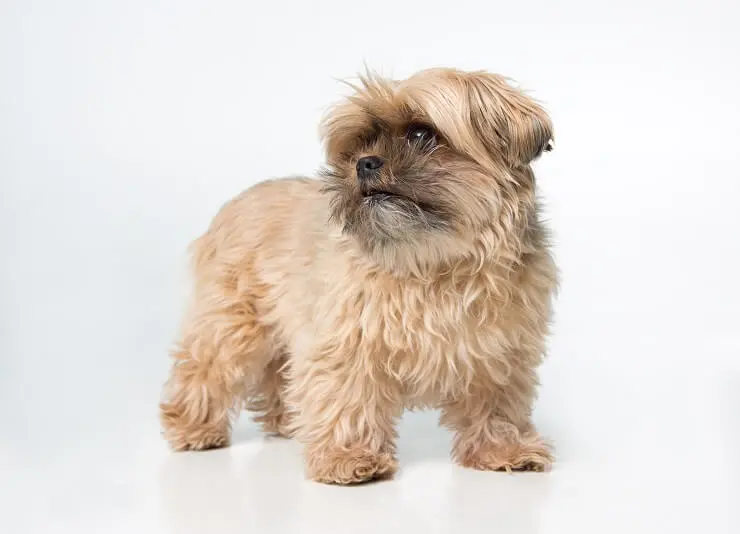The Shorkie Tzu, Yorkie Tzu, or Shorkie is a big dog trapped in a small dog’s body, and he has no idea about it! This designer dog breed is a cross between a Yorkshire Terrier and a Shih Tzu. Shorkies are most often described as energetic, playful, loyal, stubborn, and loving.
Bred as a companion dog, this little girl makes the perfect sidekick for seniors, adults, and families with older, dog-experienced kids.
Shorkies are super alert and will let you know if there’s anything strange going on.
They are very much a “velcro dog” though and don’t ever want to be parted from you, ever.
TABLE OF CONTENTS
What is a Shorkie?

From Adobe Stock
Shorkies are a designer dog. They are a hybrid between a Yorkshire Terrier and a Shih Tzu. Their temperament and appearance are somewhat variable, being part Yorkie Terrier and part Shih Tzu.
Many Shorkie breeders are looking to create a more stable breed standard to be recognized by The American Kennel Club, by breeding two Shorkies together, however, this is still the exception. Most of the time a Shorkie pup will be a cross between two purebred parent breeds.
Shorkies are toy dogs who have plenty of energy and lots of love. They are fiercely loyal to their owners and because of this, can become anxious when parted from them.
Shorkie Appearance
Shorkies are a small dog with long, sleek, straight fur that feels more like human hair than classic dog fur. They are low shedding dogs but are not hypoallergenic like the poodle crosses.
Owners enjoy having these dogs’ coats cut into a ‘teddy bear’ cut.
Their coats come in a range of colors. A good way to guess the coat color of puppies is to look at the puppies’ parents. Some common colors include black and tan, black and white, and gold.
Shorkies are compact little dogs with thin legs but a decent amount of muscle on their bodies. They have a thin, wispy tail that most often curls over their body. Their face is round with a short muzzle. The Shih Tzu is a brachycephalic breed and Shorkie may also share this characteristic sometimes.
As a crossbreed, their exact appearance is hard to predict. They could inherit any range of characteristics from either parent breed. This makes every pup a bit of a lucky dip!

From Adobe Stock
Height and Weight
As Shorkies are bred from two small dogs, it’s no surprise that they are a small breed.
- They stand at around 5 to 9 inches tall with males often being taller than females.
- As for their weight, males weigh in at 5-11lb and females at 4-8lb.
Coat and Colors
Shorkies come in a range of different colors. Some of the most common color combinations are black and tan, black and white, white and brown, gold, red or particolored. Particolored is when they are a mixture of black, white, gold, and brown.
Their coat is one of their defining features. It’s long, sleek, and low shedding. Mostly it is straight but may have the occasional wave in it. Unfortunately, it is a myth that these dogs are totally hypoallergenic but they are very low shedding dogs.
They will need regular trips to the groomers and daily brushing. The most popular coat cut for the Shorkie is the ‘teddy bear’. This keeps the fur short on the dog’s body but creates a rounded face.
Shorkie Temperament
Shorkies have the possibility of inheriting many amazing characteristics from its parent breeds.
- The Yorkshire Terrier, affectionately called the Yorkie, was first bred in the UK for ratting. They are well known for their feisty, stubborn nature. They’re always on alert and are very vocal. Although they are intelligent, they are not the easiest to train.
- The Shih Tzu shares some similar characteristics with the Yorkie. They are both alert, loyal, stubborn, loving dogs. The Shih Tzu is well known as the lapdog of many Chinese Emperors. They are an outgoing breed that seems to know they were favored by royals.
Both these parent breeds are fairly sociable and enjoy the company of people and other dogs. Shorkies are playful but also know when it’s time to relax. As both parent breeds are alert and vocal, these dogs make great watchdogs. However, their bark is definitely worse than their bite.
Unfortunately, no dog is perfect and there are some quirks that may surface in this little guy from time to time. Separation anxiety is a very common issue for these dogs.
If you leave them alone you should expect them to bark, cry and probably try a little destructive chewing. However, there are certain things you can try to reduce these behaviors (and we talk about this in the training section). If you want to own one of these pups it’s best that you keep them with you more often than not.
Shorkies are an intelligent breed, but one that’s likely to inherit the stubborn streak that their parents have – this can make them difficult to train. It’s important with Shorkies that they don’t develop small dog syndrome and start to get too big for their boots.

From Adobe Stock
How to Train a Shorkie
Unfortunately, Shorkies are a notoriously stubborn breed. They are highly intelligent but will often do whatever they want. It’s really important with this breed that you do not punish them. This will just make them more stubborn and less likely to listen to you during your dog training sessions.
The best way to train a dog is through positive reinforcement and the Shorkie is no exception. Reward your dog with treats and praise them when they demonstrate desirable behaviors – you will be amazed how well it works.
It’s important that you train them consistently and don’t become frustrated. They thrive on routine. One or two short, 15 minute 15-minute training sessions a day is best, and make sure they master what they are learning before you move on.
Separation anxiety is a big issue for these pups. A good way to help with this is crate training. Give your dog their own crate or gated area. They will sleep and eat there and it’s their place for downtime.
Make this a positive place by giving them plenty of treats when they are settled in there. Don’t keep them locked in if they start to show stress behaviors.
These dogs are not hard to socialize as people will love coming to meet them. From a young age, introduce them to plenty of different people but always be careful around kids. When socializing with other dogs keep an eye on them as their small size could mean they are accidentally hurt in rough and tumble play with larger dogs.
Caring for a Shorkie
The Shorkie is a pleasure to care for. They are adaptable to your lifestyle and really only need a small amount of intensive care. Their exercise requirements are between 30 to 60 minutes of walking a day. This includes play and training sessions.
Someone best suited for this breed has all the time in the world to give them.
They are the perfect companion dog for walks and sofa cuddles. They do have a some health risks and the costs of these should be taken into consideration (more on this later).
Exercise Requirements
The exercise requirements for a Shorkie are not very demanding. They are happy with two 15-minute walks; one in the morning and one in the evening.
As long as you are playing with them regularly in the home or a garden, they will be happy.
They do have a stubborn streak and training recall with them is challenging. Their attachment to you may work to your advantage though as they will be more interested in staying with you than exploring.
These pups are known to enjoy playing fetch and are sometimes a little ball crazy. If your Shorkie seems interested in fetching you could train them by giving them a treat or praise whenever they bring the ball back to you.
One thing to be aware of is they often have a shortened muzzle, like the brachycephalic Shih Tzu, and this means they may be more susceptible to respiratory issues. This is of particular concern in hot weather.

From Adobe Stock
Grooming and Shedding
The grooming for these guys is more demanding than other breeds. Their fur is pretty long and becomes matted quite easily. They need brushing every day to keep their fur sleek and tangle-free.
Regular trips to the groomers for trims will be important as they are a low shedding breed.
Every two months you should make sure they have their fur cut and their nails cut.
They need daily ear cleaning and teeth cleaning as they are known to have dental problems. You can use a toothbrush or dental chews if necessary.
Feeding and Diet
A fully grown Shorkie needs around 40 calories per lb of its body weight. As a puppy they will need slightly more calories – this is because they are growing.
The best way to make sure your dog is eating an appropriately balanced diet is to check the nutritional information on their food packaging.
They need high-quality dry food that’s appropriate for small breeds. These types of kibble are smaller in size and easier for dogs like the Shorkie to eat. Dry kibble is best because they are prone to dental issues.
Great quality dog food will be high in protein and fats and low in carbohydrates.
Known Health Problems
Unfortunately, Shorkies have an extensive list of health issues. Often crossbreeds are healthier than their pedigree parents but there is still a risk of them developing conditions.
We have mentioned the risks of Shorkies being brachycephalic – this creates issues with their breathing. We’ve also mentioned that they are prone to dental problems, including teeth crowding the mouth.
From the Yorkshire Terrier side, they may have issues with eye conditions such as glaucoma or lens luxation. A reputable breeder should be able to provide you with a recent clear eye test for the parents of the puppies.
With planning ahead you could get reimbursed for every vet bill from now on!
Brachycephalic airway syndrome
Brachycephalic airway syndrome refers to a particular set of upper airway abnormalities that affect dogs usually between 1 and 4 years of age. Both males and females appear to be affected equally. This syndrome is also called brachycephalic respiratory syndrome, brachycephalic syndrome, or congenital obstructive upper airway disease.
An individual dog with brachycephalic syndrome may be affected with a combination of one or more of these abnormalities. Because of the Shorkie breed’s small size with abnormally narrowed or small nostrils, larynx, and trachea, they are more prone than average to this syndrome.
Brachycephalic syndrome has been linked to serious conditions such as changes in the lungs, as well as the gastrointestinal tract including bronchial collapse (where the airways that connect the trachea to deeper airways of the lungs weaken and collapse causing further obstruction ), gastroesophageal reflux (when intestinal fluids flow back into the esophagus, the tube that connects the throat to the stomach), and chronic gastritis.
Signs of increased airway resistance in Shorkies are an increase in effort required to inhale. Most dogs with this syndrome can breathe more easily through their mouth than their nose. Generally, the more abnormalities present the more severe the signs. Mildly affected dogs will have noisy breathing, especially with exercise, and most will snort when excited and snore when relaxed or asleep.
Severely affected dogs have more pronounced airway noise, appear to tire easily with exercise, and may collapse or faint after exercise. Other signs may include coughing, gagging, retching, and vomiting. Signs are often worse in hot or humid weather.
Since obesity worsens the signs of brachycephalic airway syndrome, weight loss is an important part of treatment for overweight Shorkies. For dogs with only mild signs, their condition may be managed conservatively by controlling exercise levels, avoiding hot or humid conditions, keeping the dog in an air-conditioned area during the summer, and avoiding stress.
Corticosteroids, nonsteroidal anti-inflammatory drugs, and oxygen therapy may all be useful for short-term relief of airway inflammation or respiratory distress. However, medical management of this condition does not correct the underlying anatomical abnormalities. Surgery is the treatment of choice whenever anatomic abnormalities interfere with the pet’s breathing.
Dental disease
At the age of 4 to 5 months, your Shorkie will begin to lose those puppy teeth. By 8 to 10 months old, the pup should have all permanent teeth fully grown in.
Unfortunately, like many small dogs, Shorkies are more likely than other dogs to have problems with their teeth. Shorkie breed dental disease and tooth decay start with the everyday buildup of plaque and tartar on the teeth and progresses to infection of the gums and roots of the teeth.
To help combat oral issues, you should brush with a doggy toothbrush and dog-safe toothpaste. Like us, it is ideal to brush your dog’s teeth at least twice daily. For many dogs, once brushing becomes a part of their daily routine they will begin to expect and enjoy it. Brushing three times a week is the minimum recommendation to help remove plaque and prevent tartar accumulation.
Dogs also need to occasionally scrape to prevent such buildup, but other factors, such as overcrowded teeth, can also lead to decay. Shorkies are especially prone to this issue due to their tiny jaws. For this reason, it’s recommended to take your dog in for routine teeth cleaning by a professional.
Glaucoma
Glaucoma is a condition in which pressure is placed on the eye, causing inadequate fluid drainage in the eye. If the condition becomes chronic or persists without treatment, it will eventually cause permanent damage to the optic nerve, resulting in blindness. Glaucoma is common in certain dog breeds that are genetically predisposed, including Shorkies, and 40% of dogs affected by glaucoma will become blind in the affected eye within the first year, regardless of medical or surgical treatment.
Symptoms include:
- High pressure within the eye
- Blinking of the eye
- The eyeball may recede into the head
- Redness of the blood vessels in the whites of eyes
- Cloudy appearance at front of the eye
- Dilated pupil – or pupil does not respond to light
- Vision loss
If the disease is in an advanced stage Shorkies may display enlargement of the eyeball (buphthalmos), an obvious loss of vision, and an advanced degeneration within the eye. In addition, your dog might have headaches, with head pressing to relieve feelings of pressure in the head, a loss of appetite, and a change in attitude, such as less desire to play or interact.
As for treatment if your dog has glaucoma, your veterinarian may prescribe multiple drugs to lower the pressure within your dog’s eye and to get it into the normal range as quickly as possible to salvage vision. If a dog has a long-term condition that has gone unnoticed or misdiagnosed, the optical nerve has been damaged beyond repair and surgery may be needed.
The fluid may be drained and the fluid-producing cells altered to stop fluid buildup within the eye. However, in most long-term cases the eye will have to be removed. The empty eye socket may be closed up permanently, or the eye cavity can be filled with an orb. Most dogs will adjust over time to the loss of their eye, especially as they may have been losing their vision over some time.
Hopefully, the condition will be caught early enough and so easy to manage. You will need to visit your veterinarian regularly to have the pressure within the eye assessed and to monitor for drug interactions and make changes as necessary. They will examine the unaffected eye to determine its risk of also developing glaucoma. Because more than 50% of dogs with primary glaucoma will develop complications in their unaffected eye within 8 months, preventative therapy should be done quickly.
Lens luxation
The lens of the eye is a transparent structure that helps to focus light on the retina. Lens luxation occurs when the lens is either partially or completely dislocated from its normal position. This can result in serious complications for Shorkies, including glaucoma, retinal detachment, and blindness.
Like glaucoma (above), lens luxation can be a primary or secondary condition. Also similar, are the signs and symptoms, and management and treatments.
Hypoglycemia
Shorkies are prone to suffering from hypoglycemia (low blood glucose). If your puppy is between 8 and 16 weeks old; it’s particularly prevalent. For this reason, they need to be fed at regular intervals during the day. Put dry food out all the time, for example in a puzzle toy ball, for intermittent snacking. Also, add two tablespoons of Karo syrup to your puppy’s water for all-day sipping.
Symptoms of low blood glucose include drowsiness—especially evident in a young, active puppy—muscle weakness, staggering, disorientation, depression, and shivering. More severe signs include seizures and collapse.
Hypoglycemia in the worst-case scenario can be fatal in a dog if not controlled with a specialized diet. It is even more dangerous for small dogs like the Shorkies. If you think your call is suffering from this, call a vet immediately.
Top Tip: If your Shorkie ever goes into a hypoglycemia seizure, while you’re waiting for professional help, you should grab a clean towel and wrap it around your puppy to keep him or her warm. Rub some honey on their gums and keep them warm – the sugar in the honey will be absorbed and help elevate your teacups’ glucose concentrations. Also, you should attempt to get them to eat.
What Is a Shorkie’s Lifespan
You should expect a healthy Shorkie to live for 11-16 years.
Buying a Shorkie
How Much Does A Shorkie Cost?
A Shorkie puppy will cost between $300-$1,000.
If you don’t do your research when looking for a reputable breeder, you could easily end up buying from a puppy mill or someone that practices bad breeding.
This could lead to your puppy having more health issues. Even if they are cheaper to buy, they might well cost more in the long run.
Breed Summary Table
| Breed Characteristics | |
| Size: | 5-9 inches |
| Weight: | 4-11 lbs |
| Lifespan: | 11 to 16 years |
| Coat: | Long, sleek and straight |
| Color: | Often black and tan, black and white, gold, red or particolored |
| Do They Shed: | Low shedding |
| Temperament: | Loving, loyal, energetic, playful, feisty, alert and stubborn |
| Intelligence: | High intelligence |
| Socialization: | Very sociable, enjoy the company of people and other dogs |
| Destructive Behavior: | Barking and may also have issues with destructive chewing |
| People Skills: | Great with people especially fond of close family |
| Good with Children: | Not great with young children and might be nippy |
| Activity Levels: | Moderate activity levels |
Summary
The Shorkie is an adorable companion dog with gorgeous fur and a compact size that makes them perfect for all kinds of living arrangements. They only require 30 to 60 minutes of walking each day and, once exercised, love going back to their lapdog routine.
Shorkies suffer quite badly from separation anxiety and will need an owner who will spend the majority of the time in their company.
Although they are not well suited to houses with young children, they make great pets for older or retired people.
Shorkies are a ball of personality and fluff that will provide you with years of love and fun.
Shorkie FAQ
Are Shorkies Hypoallergenic?
Shorkies are considered to be a hypoallergenic dog breed due to their minimally shedding coat. If you have suffered from dog allergies in the past it is important that you spend some time around Shorkies before purchasing a puppy.
Do Shorkies Shed?
No, Shorkies don’t shed. Because both parent breeds have coats that shed minimally, your dog is also not going to shed a lot. Shorkies lack the undercoat which is the part of the fur that sheds. While you may find individual hair lying around, it won’t be too much and wil lbe very easily managed by daily brushing.
How Much Do Shorkies Cost?
A Shorkie puppy will cost between $300-$1,000. Do your research in looking for a reputable breeder, or you could be buying from a puppy mill or someone that practices bad breeding. This could lead to your pup having more health issues. Even if the price is cheaper, they could cost more in the long run.
More Shih Tzu and Yorkshire Terrier Mixes
Want a Shih Tzu mix or Yorkshire Terrier mix but aren’t keen on the Shorkie? Check out these other hybrid dog breeds:









I have a Shorkie and have been thinking of getting another. Mine is 8 years old and we can’t believe how smart she is. I just hope to find one in my area.
Who was your breeder?
I have a shih Tzu that had a litter of shorkies .Two solid black, a brown /black, and albino white (with pink eyes.) I have raised shorkies in the past and none have been solid white. ( with pink eyes.) I cannot find any info on them either.
I found info on white yorkies and they are extremely rare.
,
We have a black and white shorkie she’s 4 lucy she’s a little darling and such a loving dog friendly with everyone.
I have a Shorkie and he is an absolute trip most of the time. His stubborn streak is a challenge but with him you just have to make sure he understands that I am in charge not him. He is generally very well behaved and learns new thing very quickly.
Thank you for sharing Tracey
I’m getting a male shorkie in a month. Any advice for me? I would love to talk with someone.
I adopted a male Shorkie Ollie. He is a good companion for me as I am retired. They are really cute pups. All of the above info about Shorkie’s is so true. Ollie is really smart but does demand my time to play with him.
I’m looking to purchase a Shorkie but have never bought a dog from breeder so am real unsure how to go about finding a reputable one. Any advice appreciated.
I have a shorkie, and she’s the ‘most muscular dog’ my vet has seen. She can walk with us several miles before she gets even slightly tired. She looks better if she goes to the groomer to get a haircut every few weeks.
I have a male Shorkie, Milo. He’s 8 this month! A day never goes by that he doesn’t make me laugh. Incredibly smart, litter box trained, guard dog, lap dog, nap mate. He is my shadow and my best friend. Best pup ever!
How were you able to liter box train him? I am very curious. I have a 1 year old shorkie who is very smart but We’ve struggled with getting him 100% potty trained. Please let me know. Thanks
Can you give me advice on litter box training please?
We have an almost nine month young Shorkie. Archie is his name. Your description fits him to a tee!! He fits into our lifestyle just perfectly! Thank you for a well written article about Shorkies… some very good advice to use?
I have an 8 week old female, Prissy; she has been with me 1 week and is already sitting for treats after going teetee outside. she still has her lil accidents but for the most part is even scratching at the front door to go out. we are so proud of her.
We have two Shorkees, both girls. Chloe was the largest in the litter and is now 16 lbs. and Zoe was the smallest and is 8 lbs. They have very different personalities…even though she is small, Zoe is fearless, unless it is thundering outside. Chloe loves to cuddle. I didn’t want them to be by themselves while we were at work, so they have each other when we are not home. They are five years old and we got them as babies and I can’t imagine life without them!
I have a 3yr old Shorkie named Cinnamon.
She is such a joy. A ball of fun and full of personality. Thinking about breeding her in the near future at suggestions or tips for healthy pregnancy
I have a female shorkie, Apple. She really thinks she is human. I have 2 cats that she tries to discipline if they do something wrong. She is also very obsessive with me. She tries very hard not to let anyone or my cats near me. She is also litter box trained because she saw the cats doing it.
We have a new baby, Nugget, 10 weeks old, mischievous and I wouldn’t give him up for anything!! He is smart, funny and very attached to us already. Not crating him, not interested in hearing him cry but he does have a play yard, unlocked, that he loves!!
I have a shorkie ollie coming up to 9 hrs he is great indoors but outside goes for all dogs any one running mobility scooters if I take him for walks out of his area he is great
I have a 15 week old Shorkie, Gypsy. I got her at 8 weeks. She is totally house broken as long as I listen to her and take her out when she asks. Sometimes I make her wait for 10-15 minutes after her ask as she will go quicker. Otherwise she plays around and doesn’t do anything for 20-25 minutes. She is also totally crate trained. She goes to bed at 10pm and usually gets up about 6:30 am. If I have been gone for a few hours during the day, she stays in the crate and I stay up a bit later with her so she will still sleep until 6:30. She sits, stays and fetches. When I got to the mailbox, which is across the road from the house, she will ‘stay’ a bit from the road until I cross and come back. Gypsy is a sweetly and intelligent, but can be stubborn!
I have a silver and white shorkie named Minnie Minx she is 2.5yrs and an absolute darling with my baby grandchildren . She has a brother a 9yr old chihuahua both neutered and both sexualy active . I love them both to death.
I have a 4 year old Shorkie that I rescued from my local animal shelter when he was a year old. He was very much under weight and his butt was bald from flea infestation. He is my “gift from God”. Wonderful temperament, extremely smart, loyal, active (I’m his favorite chew toy) and quite social. He peed in my apartment once, the day I brought him home, and has not gone inside again. Not at my house or anyone else’s. He unfortunately is allergic to EVERYTHING though. I’ve tried so many things and nothing really helps. I’ve done the testing and immunotherapy injections and on and on. I’m trying to stay natural now, instead of the cancer causing stuff from the vet, which didn’t work well either. Any suggestions would be greatly appreciated, as I want to keep my boy happy and healthy for a long, long time ‼️?
My Shorkie makes a rather loud “huh” sound when he runs and his front legs hit the ground. He sounds like he’s been kicked in the chest every time those front legs hit. Does anyone else’s dog do that, or do you know if it’s normal?
We have a Shorkie, Beau. He will be 2 in December 2021.
He matches so many traits listed here. He is still chewing some times, but not nearly as much as when he was under a year old. But we’re still looking forward to when he calms down more. And again he’s calmed down quite a bit in the past.
The breeder said she thought Beau was a full blooded Shih Tzu but found out his mother was a mix of Yorkie and Shih Tzu after she gave birth to her first litter. 3 puppies in the litter had ears that stood straight. Beau was one of them.
Breeder said she didn’t realize they weren’t full Shih Tzu and I could return him for full refund. Not a chance!!
We have bonded with him and he with us..
We paid $400.00 for him, so we don’t feel cheated. We didn’t get the full blooded breed dog ? we thought we were getting, but we did get a very special loving ? dog ?.
My Mum has one and I look after her dog when she is away, i often feel guilty leaving her in my flat when I go to work but ensure she gets plenty of walks in the nearby park. Idea being she is happy to doze the day away until i can get back and take her out again, seems to be working so far.
We have a beautiful, black and silver, 4 month old Shorkie. She is 3/4 Shih Tzu, 1/4 Yorkie, but her brain and fur seems to be mostly Yorkie. Super smart, major Velcro dog, crate trained in 2 days.
Getting her to eat kibble has been an issue, but she’s getting better. We have a 12 year old Cavalier King Charles, who she irritates daily. She wants so bad for him to play, and he wants no part of it. We really want to get another puppy for her to play with. Not sure we can handle 2 with this headstrong personality. We are seniors. Would rather let her be Alpha Dog and get a more laid back puppy.
We love her to death though. We’re retired, and she gets all the attention she wants.